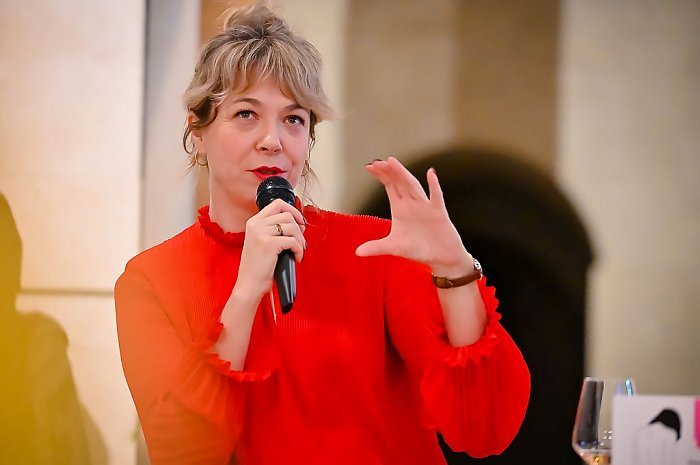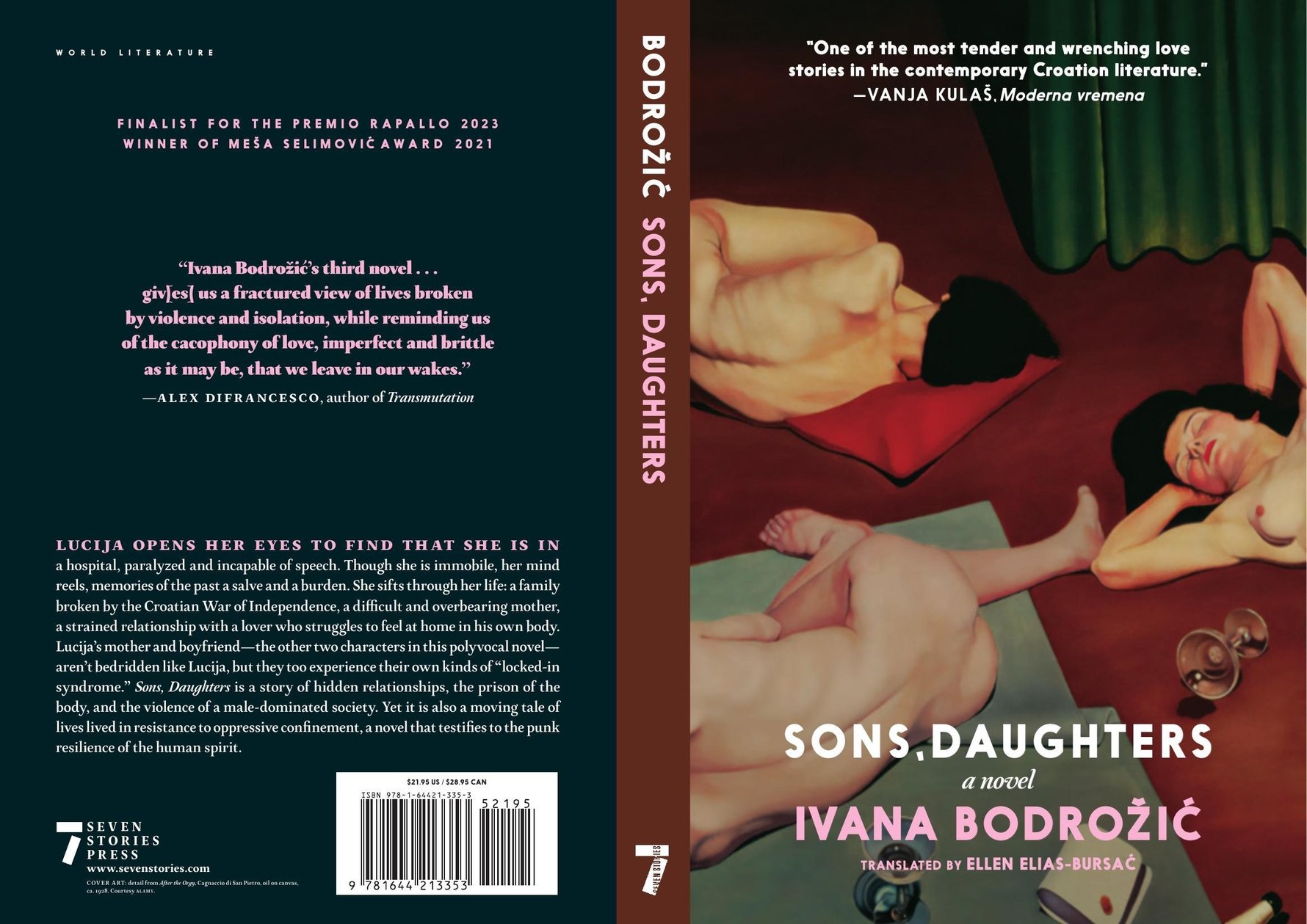Croatian literature is in a very good place in 2025, and Ivana Bodrožić is very much at the forefront of the scene. Born in Vukovar and educated at the University of Zagreb (philosophy and Croatian studies, for the record), the award-winning writer and poet has been publishing excellence since the beginning of the 21st century and continues to create magic. Her first collection of poetry (Prvi Korak u tamu, or “First Step into Darkness”) was published in 2005 and picked up a Goran Award for Young Poets, and a film adaptation of her 2010 work Hotel Zagorje is currently in the working stages. Her most recent work — the spellbinding “Sons, Daughters” — won the Meša Selimović Prize for the best novel of 2020, and we had the pleasure of talking to Ivana about her work and more.

CIYP: Ivana, your novel Sons, Daughters has just been shortlisted for the prestigious Dublin Literary Award 2025. It was published in English in 2024, translated by Ellen Elias-Bursać, after initially being released in Croatia in 2020. The novel has sparked quite a bit of conversation on the Croatian literary scene and, we believe, beyond. The nomination will surely encourage many to pick up the book. Do you have any feedback from your American publisher about how Sons, Daughters is being received by readers? Can American readers connect with the themes that reflect the issues our society is grappling with?
Ivana Bodrožić: The novel’s U.S. edition was published in April last year. Apart from occasional feedback from American readers on Instagram—which has reassured me that the book is being read and that readers and I share some understanding—I haven’t yet received an official report from the publisher, as that usually comes after a year. I like to think that in literature, regardless of the subject matter, when a work is artistically relevant, it contains something universally human that transcends great distances and even language barriers—provided, of course, that the translator has done an excellent job. As for the themes, I believe they are universal too. The sense of confinement within oneself or within society is present everywhere. Unfortunately, I fear that this theme will remain relevant for a long time, especially given current political circumstances. Patriarchal systems, which are deeply oppressive to women, minorities, and anyone who doesn’t conform to their values, continue to dominate globally.

CIYP: In your novel, you explore the inner struggles of your characters through their fears, inner conflicts, powerlessness, and sorrows—the fine, sometimes unconscious line between despair and the yearning to escape their lives, to break free. This sense of confinement is multifaceted, yet what binds it all is the marginalization and neglect that society inflicts, as well as our general lack of empathy for others.
How much of the novel was shaped by your personal experiences, especially in intimate relationships, such as those with your mother as a daughter or with your children as a mother?
Ivana Bodrožić: In terms of motherhood, I think I could only have written that novel at the exact moment I did. On one side, I had children on the brink of adolescence, just beginning their struggle for independence, and on the other, I had my relationship with my own mother, before whom, no matter how old we are, we somehow always remain children. This dual perspective—where everyone feels they know best, which is partially true but also fraught with concern as we try to spare our children unnecessary suffering—sharpened my observations in a unique way. It helped me avoid judgment and instead try to understand those eternal struggles we have with our parents, our children, and the parents and children within us. Everyone’s pain is their truth. That realization became crucial to how I developed the characters. Everyone has the right to their own pain, but if we open ourselves to others without prejudice, even just a little, life could be easier.
CIYP: How challenging was it to step into someone else’s shoes to write such a layered novel? Do you see writing about these themes as your way of fighting, or perhaps your courage to stay true to yourself?
Ivana Bodrožić: I don’t think it’s that challenging if you find something of yourself in those “other shoes.” We’re all far more similar than we are different, especially when we focus on our shared needs: a safe environment, acceptance, compassion, and the freedom to express ourselves. I wouldn’t necessarily frame it as a fight, because fighting implies wanting to impose your beliefs or invade someone else’s space. Instead, in writing this novel, I was guided more by a desire to lower that defensive stance, to say what I think matters, but also to hear others. Every act of expression or creation might seem courageous, but with experience, I’d say it takes even more courage to live a life where you don’t express yourself—that’s harder in every sense.
CIYP: The novel paints a rather dark picture of society—open intolerance and societal violence toward anything different. Five years later, looking back from today’s perspective, do you see any changes? Have things improved, or do you simply see them differently?
Ivana Bodrožić: It’s hard for me to give a definitive analysis—I’d need to rely on sociological research and data. So I can only speak from my impressions. I think some things have improved, at least in the sense that certain topics are no longer taboo, and the fact that a novel addressing these themes has gone through four printings is encouraging. On the other hand, if we look at the political situation here and worldwide, we can’t ignore the resurgence of regressive tendencies trying to strip away already hard-won rights—especially regarding equality, the right to choose, and inclusivity. There’s still a long road ahead, and we must remain vigilant. Human nature requires cultivation with every generation.
CIYP: What themes are capturing your attention now? Are you working on a new story?
Ivana Bodrožić: I can share that at the end of February, my new book of prose titled Fiction will be published by Fraktura. It also touches on themes of equality, motherhood, solidarity, human nature in general, and the exploitation of everything around us—which, quite possibly, will lead us to climate collapse in the near future. However, like in my previous books, there’s some humor too—it’s not all bleak, much like life itself. I can say I thoroughly enjoyed writing it.
CIYP: Which contemporary Croatian writers, particularly female authors, would you recommend to our readers?
Ivana Bodrožić: Definitely the novels and poetry of Olja Savičević Ivančević, the prose of Slavenka Drakulić, and the works of my dear colleagues Robert Perišić and Kristian Novak, who are also incredibly important to me. All of them are available in British or American editions. They’re ours, but truly global. 😊





Comments